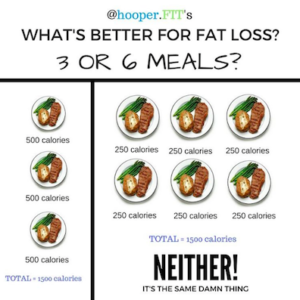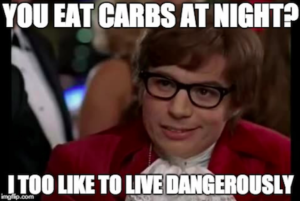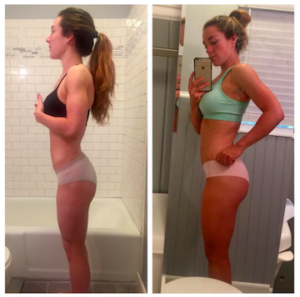You know that skinny friend of yours who can crush a pizza at lunch and then a rack of ribs at dinner and still never gain a pound? It’s probably their metabolism, right?
I hate those people.
They were obviously born with the same metabolic advantage as a hummingbird on meth while the slightest scent of pizza sends the button on your pants flying across the room. Those jerks.
It’s definitely because they’re younger, right?
While it is true we all have individual differences in metabolisms, muscle mass, and physical activity, it’s not to the detriment most want to believe.
The uncomfortable truth?
It’s tempting to throw our hands up in the air and absolve ourselves of any personal responsibility by blaming our increasing waistline on a slower metabolism, but the reality is — most of us are falling for bullshit being perpetuated by the diet and food industry.
It’s not entirely your fault, though.
The industry is engineered to prey on your insecurities.
People who are happy with themselves don’t buy a lot of products.
If the diet industry was built on the platform that your metabolic rate is healthy and normal, you’d be less inclined to drop your hard-earned cash on magical supplements, detoxes, body wraps, and other ridiculous fat loss scams.
So the next time you see a photoshopped fitness model on the cover of a magazine and start feeling bad about yourself, remember that’s exactly how the dieting industry wants you to feel.
In an effort to shed some light on these common misconceptions, let’s discuss a few myths on metabolism so we can all be a little smarter moving forward.
Myth #1: Skinny people have faster metabolisms
So what is the deal with the Jimmy Chestnuts of the world who can eat 73.5 hot dogs in ten minutes and still manage to maintain a healthy weight?
Metabolism actually does have quite a bit to do with body size, but not in the way we think. According to Dr. Yoni Freedhoff, assistant professor at the University of Ottawa, “Skinny people almost invariably have slower resting metabolisms; there is literally less of them to burn while at rest.”
Knowing this, it should come as no surprise that larger individuals usually have a higher metabolism. This can mostly be attributed to the effect muscle has on the amount of calories someone burns each day.

If we were to compare two individuals similar in weight and size, the person with the larger amount of muscle mass is almost always going to have the faster metabolism. So if you were looking for another reason to incorporate strength training into your regular workout routine, that golden nugget of knowledge should be the kick in the ass you need.
After all, the research has shown that extra muscle can help accelerate weight loss significantly faster than a diet-only plan. And who are we to argue with the guys in white lab coats?
Myth #2: Metabolism decreases significantly as you age
Okay, before the keyboard warriors start sending me hateful emails, no one here is saying that your metabolism doesn’t slow down as you age. What I am saying is that just because you’re about to celebrate your 40th birthday that doesn’t mean you’re going to wake up the next day needing a pair of fat pants. A dip in your metabolic rate will happen over time.
That said, your metabolism does slow down as you age, but it’s not nearly as catastrophic as most magic pill pushers would have you to believe. Conventional wisdom states that because there’s a decline in muscle mass as you age, your metabolic rate will take a hit as well.
A 60 year-old man is rarely going to have as much muscle as a 20 year-old man, even if they’re following an identical nutrition and workout program. The best thing you can do to face this issue head-on is build a lean and muscular physique and learn the behavioral tools necessary to maintain those habits for the rest of your life.
The good news? Metabolism is unlikely to be affected by age much at all if you remain active, include strength training in your exercise regimen, and make whole foods a priority.
Myth #3: Frequent eating boosts metabolism
Ah, yes. Here we are. The whole “how many meals per day is best for fat loss?” schtick. I actually just posted about this on my Instagram account last week. What a shit storm. For whatever reason, people are really married to the idea that six smaller meals throughout the day is superior for fat loss as opposed to three larger meals.

The fact is, how frequently someone eats has little to do with the speed of their metabolism. Dr Freedhoff explains, “Eating every four hours is popular because eating frequently, for many, helps them to keep a lid on both stomach hunger and cravings. That, in turn, allows for better portion and choice control.”
The bottom line: There is no scientific research that supports the claim that six smaller meals produces better results for fat loss than three larger meals.
That’s not to say frequent eating doesn’t have its place, but in my experience with clients — those who struggle with portion control seem to do better with three meals a day as opposed to six. Six meals means three additional opportunities to overeat. And three more opportunities for the food industry to push more of their gimmicky “100 calorie snack packs” onto you.
When it comes to fat loss, calorie intake is king. Always. And how you choose to divide up those calories throughout the day is 100% dependent on personal preference. Your dieting success is wholly dependent on your ability to create an enjoyable diet that is sustainable because it was made for you, by you.
You don’t need more food rules from outside sources that want to manipulate you into buying their latest miracle food; you simply need to create a plan that is sensible, realistic, and effortless to maintain.
Myth #4: Carbs at night turn into fat
“Don’t eat after 8pm or it will get stored as fat while you sleep.” This is an overly simplistic view on metabolism, yet it’s one of the most popular pieces of nutrition advice you’ll hear being shouted from the rooftops.
While it may be tempting to think our bodies run according to a clock, this completely dismisses the variety of variables that contribute to our metabolic rate such as hormones, food quality, energy expenditure, and how our bodies process fuel.
Instead of getting caught up in the timing of our meals, we would do better to observe the nutritional value, quality, and quantity of the food being consumed. There is no metabolic advantage to eating meals earlier in the day rather than later.

Dr. Freedhoff likens this scenario to filling up a car, “The time of day you fill your car with gas isn’t going to impact how far you’ll go on that tank,” he said. “Provided you’re eating high-quality food in the right portions, most individuals won’t notice a difference between eating at night versus earlier in the day.”
If you’re eating the appropriate amount of calories from whole foods, eating later isn’t going to impact the outcome of your fat loss.
Myth #5: Breakfast is the most important meal of the day
Listen, I hate to be the barrier of bad news, but you know how you grew up hearing adults and TV commercials telling you that breakfast was the most important meal of the day?
Well, they lied to you.
That catchy line is another marketing ploy created by the food industry to manipulate you into buying their breakfast foods. As Mike Deibler, a professor of exercise physiology at San Diego Miramar College said, “When you eat breakfast — or any other meal — there is something called ‘thermic effect of food,’ which is the result of the calories your body expends actually breaking down the food you eat. However, this only accounts for about 10 to 15% of total metabolism.”

The bottom line? The only diet that will work is the one that you can stick to. If you wake up in the morning without an appetite, there’s no need to force feed yourself in the name of “revving your metabolism.” Save those delicious calories for later in the day when you’ll truly enjoy them.
Myth #6: High Intensity Interval Training (HIIT) boosts your metabolism
While high intensity interval training does temporarily increase calorie burn, it doesn’t necessarily increase the rate of your metabolism.
As Rachel Straub, MS, and exercise physiologist states, “Metabolism is directly influenced by your amount of muscle mass, and higher muscle mass equates to a higher metabolic rate.” She points to one recent study published in the journal Medicine & Science in Sports & Exercise that found that resistance training increases muscle while reducing fat, but cardiovascular exercise by itself only reduces fat alone.
Now, that’s not to suggest that there isn’t any increase in metabolic rate after an intense cardiovascular workout, but after an hour or two most of those effects will evaporate like a fart in the wind. Ultimately, if you want to increase your metabolic rate, you’re going to have to include strength training in your program to build more fat-burning muscle.

The Facts
As much as you may want to deny the painful truth that it’s not really your metabolism that’s preventing you from losing weight, you’ll have to confront the uncomfortable reality that you do, in fact, have all the tools required to lose fat at a healthy rate.
This is actually good news. Knowing that you can increase your metabolism by incorporating strength training into your workout routine will help you build the necessary muscle to burn more calories at a faster rate.
A few other things that can help keep your metabolic rate humming along:
Healthy sleeping patterns. The amount of rest you get each night doesn’t only affect your mood and productivity the next day, but those guys in the white lab coats also discovered sleep directly impacts your metabolism. Sleep-deprived individuals have a dip in blood sugar levels and are thus more likely to experience hunger.

Water: the miracle drug. If you’re still consuming high calorie drinks on the regular, then it’s time to toss them aside. Permanently. Gulping more water can have a positive impact on how many calories you burn throughout the day. This is due to a process called thermogenesis (is it me or does that sound like a Biblical name?). Thermogenesis is when the body burns energy to warm up the water to body temperature. Hydrating with water also plays a key role in regulating whole-body metabolism (particularly when you’re sweatin’ to the oldies with Richard Simmons).
Caffeine: the real miracle drug. Good news for you caffeine addicts, it turns out that a cup of joe may give you more than just the feel goodz, man midday. When researchers gave subjects coffee and then measured their caloric burn, they found that those consuming caffeine burned more calories than their decaf-ordering friends…who probably also hate puppies and napping.
Protein (or as some as you better know it, “Gainz dude, brah). The foods you eat have a profound impact on metabolism, but if there’s one thing researchers know to be true, it’s that taking in adequate amounts of protein has a higher rate of energy expenditure at rest than those pesky carbohydrates and fats.
Questions? Concerns? Did this article suck? I want to hear it all. Let me know here.

